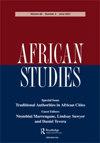Catching the Disc: Panopticism, Surveillance and Punishment as a Pedagogical Tool in the Acquisition of Colonial Languages in Post-Colonial Schooling
IF 1
4区 社会学
Q2 AREA STUDIES
引用次数: 0
Abstract
ABSTRACT This article analyses the use of ‘the disc’ – a curious pedagogical post-colonial artifact, intended to discourage native languages – a tool employed in teaching colonial languages in schools in parts of the post-colonial world. The disc assumes many forms depending on where it is employed, but it is usually an object fashioned to be carried, or worn as an article of clothing, or a cap making it reminiscent of the Dunce Cap. The role of the disc and its variants is the same: to leverage surveillance and shaming and channel them towards the purposes of instilling school discipline, promoting moral education and often as a pedagogical tool. However, the use of shame for these purposes has since fallen out of favour in the West (Stearns & Stearns 2017). Using Michel Foucault’s notion of panopticism to illuminate the workings of this artifact, this article focuses on shedding some light on the indignities suffered by speakers of native languages in such post-colonial school systems. As Foucault (1980, 30) wrote, power reaches into the very grain of individuals, touches their bodies and inserts itself into their actions, attitudes, their discourses, learning processes and everyday lives. This article’s main gist is on this one aspect of colonial legacy in education: the language policies that put a premium on mastery of colonial over native languages. Among the issues typical in post-colonial discourse, this vestige represents apt exemplification of deleterious aspects of colonialism that continue to present perverse challenges in post-colonial societies. It however concurs, in spite of the blistering critique of the emphasis on colonial language use, and in light of a rapidly globalising world, with Kevin Forster’s (2003) analysis, which concludes that in instances where contemporary values like empowerment and perfection is gained while sacrificing autonomy and freedom from surveillance, subjugation could be seen as worthwhile.抓住光盘:泛视主义、监视和惩罚作为后殖民主义学校中殖民语言习得的教学工具
摘要本文分析了“光盘”的使用情况,这是一种奇怪的后殖民时期的教学工具,旨在劝阻后殖民世界部分地区学校教授殖民语言时使用的母语。圆盘有多种形式,这取决于它的使用地点,但它通常是一种可以携带的物品,或作为衣服佩戴,或是一顶让人想起Dunce cap的帽子。光盘及其变体的作用是一样的:利用监视和羞辱,并将其引导到灌输学校纪律、促进道德教育的目的,通常是作为一种教学工具。然而,出于这些目的使用羞耻感在西方已经失宠(Stearns&Stearns 2017)。本文利用米歇尔·福柯的全景主义概念来阐明这件作品的运作方式,重点揭示了母语使用者在后殖民主义学校系统中所遭受的侮辱。正如福柯(1980,30)所写,权力深入到个人的内心深处,触及他们的身体,并插入他们的行动、态度、话语、学习过程和日常生活。这篇文章的主旨是关于殖民地教育遗产的一个方面:重视掌握殖民地语言而非母语的语言政策。在后殖民主义话语中的典型问题中,这一遗迹恰当地体现了殖民主义的有害方面,这些方面在后殖民社会中继续带来不正当的挑战。然而,尽管人们对强调殖民语言的使用提出了激烈的批评,而且鉴于世界正在迅速全球化,它与凯文·福斯特(Kevin Forster)(2003)的分析一致,该分析得出的结论是,在获得赋权和完美等当代价值观的同时,牺牲了自主性和免于监视的自由,征服可以被视为是值得的。
本文章由计算机程序翻译,如有差异,请以英文原文为准。
求助全文
约1分钟内获得全文
求助全文

 求助内容:
求助内容: 应助结果提醒方式:
应助结果提醒方式:


